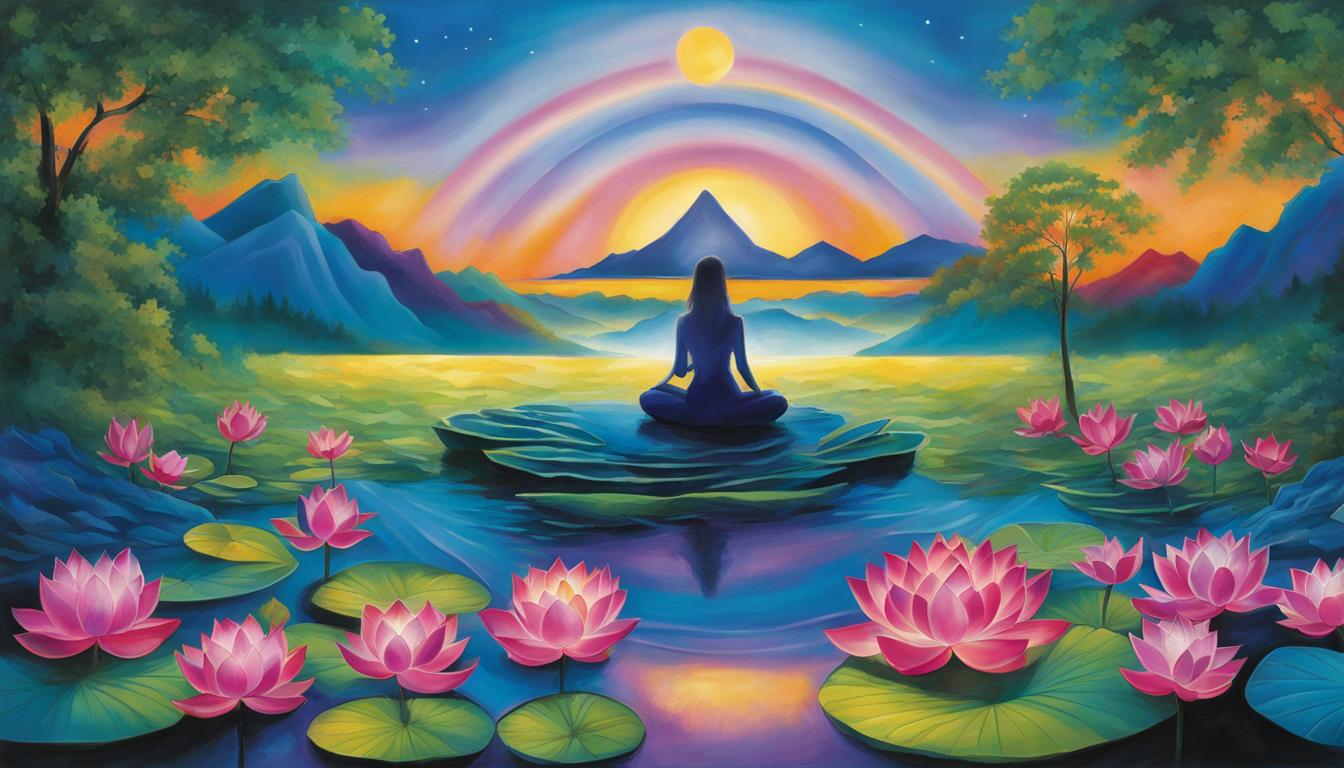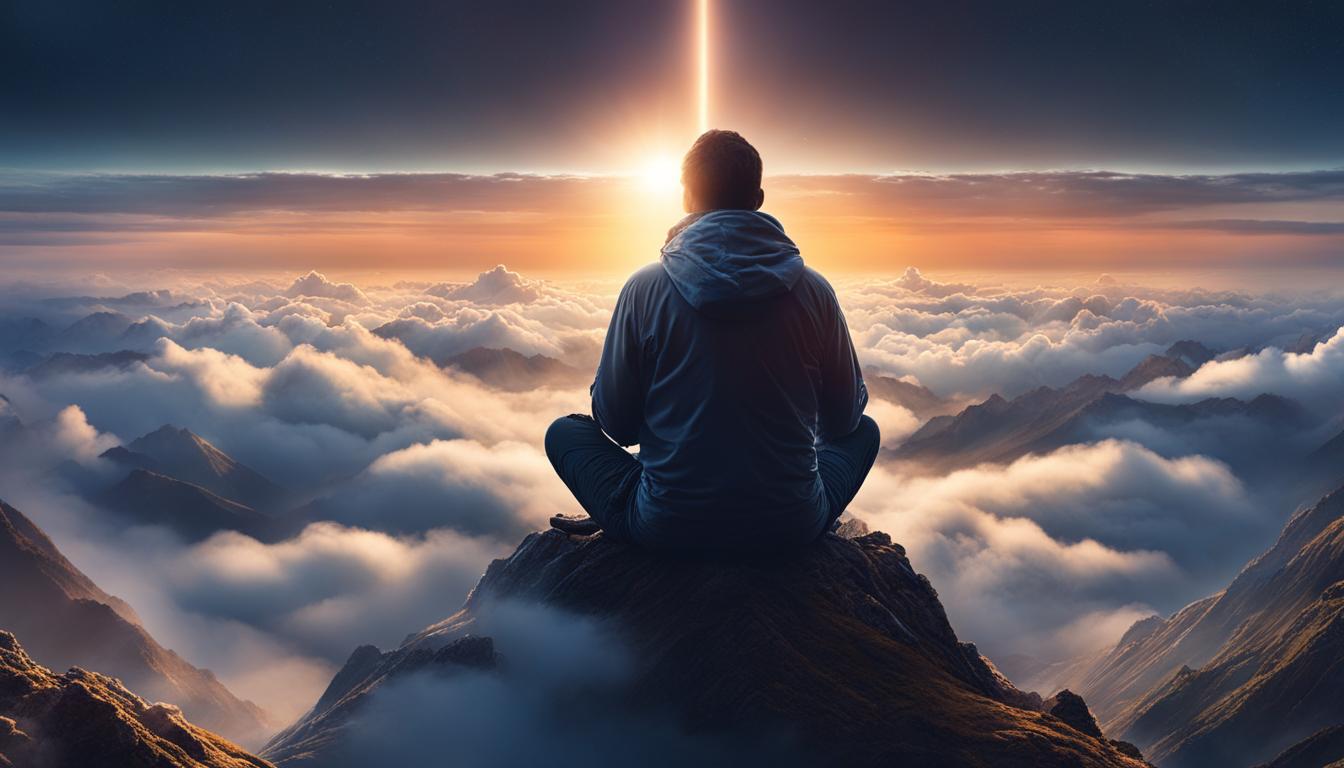Welcome to the beginner’s guide to spirituality! Whether you’re just starting to explore spirituality or looking for a fresh perspective, this guide is here to help you navigate the journey. Spirituality is an enriching and transformative path that can bring greater meaning and purpose to your life. It offers an opportunity to understand yourself, others, and the world around you on a deeper level.
Embarking on a spiritual journey may seem daunting at first, but rest assured that you’re not alone. Many others have walked this path before you, and there are plenty of resources available to support your exploration. This guide will provide you with an introduction to spirituality, practical tips, and advice to help you get started on your own journey towards spiritual growth and self-discovery.
Key Takeaways:
- Exploring spirituality allows you to find greater meaning and purpose in life.
- Spirituality is a personal, self-guided journey that goes beyond religious beliefs.
- Starting your spiritual journey requires respect for others and embracing unanswered questions.
- Cultivating spirituality involves practices like meditation, journaling, and seeking professional help for healing.
- Avoid common mistakes in your spiritual practice by staying open and accepting of others’ journeys.
Understanding the Importance of Spirituality
Our understanding of spirituality plays a crucial role in shaping our beliefs, values, and actions. It goes beyond religious practices and encompasses a broader perspective on life. Spirituality provides us with a sense of purpose, meaning, and connection to something greater than ourselves.

Exploring spirituality allows us to delve deeper into various aspects of our lives. It helps us understand ourselves better and uncover our true identity. Through spirituality, we gain insights into our relationships with others and the world around us.
Spirituality offers a unique lens through which we can navigate the challenges and experiences of life. It guides us in making choices aligned with our values and empowers us to lead a more fulfilling existence.
“Spirituality gives greater context to our existence, aligning our actions with our deepest sense of purpose.”
By engaging in spiritual practices, such as meditation, mindfulness, and self-reflection, we can cultivate a sense of peace, harmony, and inner growth. These practices help us develop a deeper connection with ourselves and the world, facilitating personal transformation.
Embracing spirituality allows us to tap into our inner wisdom and intuition. It invites us to explore the mysteries of life and seek answers to profound questions about our purpose and existence.
Moreover, spirituality encourages us to embrace compassion, love, and kindness towards ourselves and others. It promotes a sense of unity and interconnectedness, fostering harmony in our relationships and society as a whole.
“Spirituality expands our consciousness, allowing us to experience the interconnectedness of all things.”
Ultimately, understanding the importance of spirituality enables us to lead more meaningful lives. It provides a guiding light in times of uncertainty and empowers us to navigate the complexities of the human experience with grace and wisdom.
Defining Spirituality
Spirituality can be broadly defined as a deep sense of connection or belief in something greater than ourselves. It encompasses a wide range of personal experiences and beliefs that go beyond religious practices and traditions. Unlike religion, which often follows established doctrines and rituals, spirituality is a personal, self-guided journey.
At its core, spirituality is about discovering a sense of meaning, purpose, and interconnectedness with the world around us. It involves exploring our inner selves, understanding our values, and seeking a deeper understanding of life’s mysteries.
Spirituality is not confined to any particular religion or belief system. It welcomes individuals from various backgrounds and encourages them to embark on their unique spiritual journeys. It is a deeply personal experience that allows individuals to find their own path, drawing from different teachings, philosophies, and practices.
In essence, spirituality is about connecting with our authentic selves and the greater universe. It is a quest for self-discovery, self-awareness, and self-transcendence. Through spiritual practices such as meditation, contemplation, mindfulness, and prayer, individuals deepen their connection to their inner selves and the divine.
Spirituality vs. Religion: What’s the Difference?
While spirituality and religion often intersect, it is important to distinguish between the two. Religion is an organized system of beliefs, practices, and rituals that seek to connect individuals with a higher power or divine being. It often adheres to specific doctrines and is associated with formal institutions such as churches, mosques, synagogues, or temples.
On the other hand, spirituality is a broader and more individualistic concept. It transcends specific religious boundaries and allows individuals to explore their personal beliefs and experiences of the divine. Spirituality emphasizes personal growth, inner reflection, and a direct connection with the divine or higher power, without the need for intermediaries or strict adherence to religious doctrines.
While religion provides a structured framework and community for worship and spiritual practices, spirituality is more flexible and adaptable. It allows individuals to incorporate spiritual practices and beliefs into their daily lives in a way that feels authentic and meaningful to them.
Getting Started on Your Spiritual Journey
Embarking on a spiritual journey can be an exciting and transformative experience. Whether you are seeking inner peace, personal growth, or a deeper connection to the universe, beginning steps to spirituality can open up a whole new world of possibilities. Here are some essential guidelines to help you get started on your spiritual journey.
“Respect for those who have come before.”
As you embark on your spiritual journey, it is important to recognize and honor the wisdom of those who have walked the path before you. Learning from spiritual teachers, reading spiritual texts, or seeking guidance from experienced practitioners can provide valuable insights and inspiration.
“Recognition that your journey is unique.”
Your spiritual journey is personal and unique to you. It is essential to embrace this individuality and not compare your path to others. Honor your own beliefs, experiences, and intuition, and trust that your journey will unfold in its own way and at its own pace.
“Start right where you are.”
There is no need to wait for the perfect conditions or the “right” time to begin your spiritual journey. Start right where you are, in this moment. Whether you are just beginning to explore spirituality or have been on a path for some time, each step you take is important and valuable.
“Asking for guidance.”
One of the key aspects of starting your spiritual journey is being open to guidance from higher powers, the universe, or your own inner wisdom. Take time to connect with your intuition, meditate, or pray, and ask for guidance in your spiritual exploration. Trust that the answers will come to you when the time is right.
“Practicing regularly.”
Consistency is key when it comes to spirituality. Incorporate spiritual practices into your daily routine, such as meditation, journaling, or mindful activities. Regular practice will help you cultivate a deeper connection with your spiritual self and create a space for growth and reflection.
“Embracing unanswered questions.”
When starting your spiritual journey, it is essential to embrace the unknown and be open to unanswered questions. Spirituality is a vast and complex realm, and it is natural to encounter aspects that may be challenging or difficult to understand. Trust in the process and allow yourself to explore without needing all the answers.
By following these initial steps, you can set a strong foundation for your spiritual journey. Remember, exploring spirituality is a lifelong process that requires an open mind, vulnerability, and a willingness to grow. Embrace the journey and enjoy the transformative experiences that spirituality can bring.

Cultivating Spirituality as a Beginner
As a beginner in the world of spirituality, it can feel overwhelming to know where to start. The good news is that there are plenty of beginner-friendly spiritual practices that can help you cultivate your spirituality and deepen your connection to the spiritual realm.
1. Meditation
Meditation is a powerful practice that has been used for centuries to quiet the mind, reduce stress, and foster a sense of inner peace. Find a quiet and comfortable space, close your eyes, and focus your attention on your breath. Allow your thoughts to come and go without judgment, simply observing them. Consistency is key, so try to set aside a few minutes each day for meditation.
2. Journaling
Journaling is a wonderful tool for self-reflection and self-discovery. Set aside some time each day to write down your thoughts, feelings, and experiences. Use your journal as a safe space to explore your spirituality, ask questions, and record any insights or revelations that come to you.
3. Unleashing Creativity
Creativity is a powerful gateway to spirituality. Engage in activities that allow you to express yourself creatively, such as painting, writing, dancing, or playing music. Let go of any expectations or judgments, and allow your creativity to flow freely. This can be a deeply cathartic and spiritual experience.
4. Seeking Professional Help for Healing
If you are struggling with past traumas or emotional wounds, seeking professional help can be an important step in your spiritual journey. A therapist or counselor can provide guidance, support, and tools for healing, allowing you to move forward with greater clarity and self-awareness.
Remember, cultivating spirituality is a personal journey, and what works for one person may not work for another. Explore different practices, listen to your intuition, and trust that the path will unfold naturally. Embrace the process of self-discovery and enjoy the transformative power of spirituality.

Avoiding Common Mistakes in Your Spiritual Practice
When embarking on your spiritual journey, it is essential to be aware of common mistakes that beginners often make. By avoiding these pitfalls, you can create a more authentic and fulfilling spiritual practice. Here are some key mistakes to keep in mind:
Confusing Spirituality with Materialism
One common mistake is equating spirituality with material possessions or external achievements. True spirituality goes beyond the accumulation of wealth or material goods. It involves finding inner peace, connecting with your higher self, and fostering meaningful relationships. By shifting your focus from external validation to inner growth, you can deepen your spiritual practice.
Dismissing Other Spiritual Traditions
Spirituality is a deeply personal journey, and everyone’s path is unique. It is important to approach other spiritual traditions with an open mind and respect. Avoid dismissing or belittling practices that may be unfamiliar to you. By embracing diverse perspectives, you broaden your own understanding and deepen your spiritual connection.
“Spirituality is not about accepting one truth, but embracing the infinite wisdom that emerges from the collective human experience.” – [Author Name]
Overcomplicating or Overthinking
Another common mistake is overcomplicating or overthinking your spiritual practice. Remember that spirituality is about simplicity and presence. Avoid getting caught up in complex rituals or rigid rules. Instead, focus on cultivating mindfulness and being fully present in the moment. Allow your spiritual practice to flow naturally and intuitively.
Lack of Self-Reflection and Self-Acceptance
Spiritual growth requires self-reflection and self-acceptance. Avoid seeking external validation or constantly comparing yourself to others on your spiritual journey. Embrace self-compassion and cultivate a deep understanding of your own strengths and limitations. By accepting yourself fully, you can experience profound spiritual transformation.

By being mindful of these common mistakes in your spiritual practice, you can navigate your journey with authenticity and grace. Remember, spirituality is a lifelong process of self-discovery and growth. Embrace the lessons, celebrate your progress, and enjoy the beauty of the spiritual path.
Recommended Books for Spiritual Beginners
Looking for spiritual books to kickstart your journey? Here are some highly recommended titles that offer valuable guidance and insights for beginners in the realm of spirituality. These books provide a wealth of knowledge and inspiration to help you navigate your spiritual path:
“The Power of Now” by Eckhart Tolle: This transformative book teaches you the importance of living in the present moment and finding inner peace.
“The Soul Searcher’s Handbook” by Emma Mildon: A comprehensive guide that explores various spiritual practices and offers practical advice for self-discovery and personal growth.
“Light Is the New Black” by Rebecca Campbell: This uplifting book encourages you to embrace your unique spiritual gifts and step into your authentic self.
“The Untethered Soul” by Michael A. Singer: An insightful exploration of consciousness and spirituality, guiding you on a journey of self-realization and inner freedom.
“Conversations With God” by Neale Donald Walsch: This thought-provoking book presents a series of conversations between the author and God, offering profound insights on life’s big questions.
These books serve as a beginner’s guide to spirituality, covering various topics such as mindfulness, self-discovery, and connecting with a higher power. Whether you are just starting your spiritual journey or looking to deepen your understanding, these recommended books will provide you with valuable wisdom and inspiration. Remember, knowledge is power, and these books have the potential to transform your perspective and open doors to new spiritual experiences. Happy reading!

Breaking Free from Mental Chatter
Our minds can be a constant source of chatter, filling our thoughts with unnecessary noise. This incessant mental chatter can distract us from experiencing true peace and clarity. However, on the path of spirituality, we have the opportunity to break free from this cycle and quiet the mind.

When we engage in spiritual practices, we begin to recognize that the thoughts and voices in our head are not who we truly are. They are merely products of conditioning and external influences. Spiritual growth involves understanding that the mind is a tool, not our identity.
“The mind is like a wild horse that needs to be tamed. By quieting the mind, we can harness its power and direct it towards higher states of consciousness.” – Emma Johnson
Controlling our thoughts in spirituality requires patience, practice, and self-awareness. Meditation is a powerful tool that allows us to observe our thoughts without attachment or judgment. As we sit in stillness and silence, we cultivate the ability to detach from the mental chatter and focus on the present moment.
By quieting the mind, we create space for deeper insights and intuitive guidance to emerge. We can tap into the wisdom of our true selves and connect with our spiritual essence. Breaking free from mental chatter allows us to access a state of inner peace and clarity, enabling us to navigate life from a place of authenticity and spiritual alignment.
Quieting the Mind: Practical Tips
Here are a few practical techniques to help you quiet your mind:
- Practice mindfulness: Engage in activities like walking, yoga, or mindful eating to anchor your awareness in the present moment.
- Cultivate self-compassion: Be kind and gentle with yourself, understanding that quieting the mind is a gradual process.
- Journaling: Write down your thoughts and feelings to release them from your mind and gain clarity.
- Limit distractions: Create a peaceful environment by minimizing noise, turning off notifications, and disconnecting from technology.
Remember, quieting the mind is an ongoing practice. It requires patience, dedication, and a commitment to self-exploration. As you continue on your spiritual journey, allow yourself to let go of mental chatter and embrace the stillness within.
Managing Energy Flows for Spiritual Growth
Understanding and managing our energy flows is vital for our spiritual growth. In spirituality, energy is seen as a fundamental force that impacts our emotions, thoughts, and overall well-being. By harnessing the power of energy management, we can experience greater clarity, inner peace, and spiritual alignment.
Recognizing energy patterns is the first step towards managing our energy flows. Just as a river flows, energy moves through us. It can be a reflection of our thoughts, emotions, or external influences. By becoming aware of these patterns, we can gain insight into how they may be affecting us and take the necessary steps to shift or release them.

Managing energy flows requires a practice of mindfulness and presence. When we are fully present, we can observe the energy within and around us without judgment or attachment. This allows us to let go of emotional disturbances and stay grounded in the present moment.
“Energy flows where attention goes.” – Unknown
There are various techniques and practices to manage energy flows in spirituality. Meditation, breathwork, and movement-based practices like yoga or Tai Chi are powerful tools for cultivating awareness and harmonizing energy. These practices help us realign our energy, release blockages, and create an overall sense of well-being.
In addition to personal practices, surrounding ourselves with positive and uplifting environments can also support our energy management journey. Being in nature, engaging in creative activities, and spending time with like-minded individuals can all contribute to creating a conducive energetic atmosphere.
As we become more attuned to our energy flows, we develop a deeper understanding of ourselves and our interconnectedness with the universe. We can consciously direct our energy towards our intentions, goals, and spiritual growth. This self-awareness allows us to navigate life with more grace and authenticity.
Embracing the Amplifying Power of Energy
The energy within us is not limited to our personal well-being—it can also extend outwards to positively impact the world around us. When we manage our energy flows effectively, we become conduits for love, compassion, and healing. This transformative energy radiates from us, touching the lives of those we encounter.
By managing our energy flows, we unlock our potential for personal and spiritual growth. We become more aligned with our true essence and experience a greater sense of purpose and fulfillment on our spiritual journey.
Breaking down the Walls of the Ego
When it comes to spirituality, our egos can often create barriers that prevent us from fully experiencing its profound essence. These walls hinder our ability to connect deeply with ourselves and the spiritual realm. However, there are ways to overcome and dismantle the ego, allowing us to embrace spirituality more fully.
One crucial step in breaking down the walls of the ego is coming to peace with our pain. The ego tends to hold on to past hurts, allowing them to define us and our experiences. By letting go of resentment, anger, and resentment, we can free ourselves from the limitations imposed by our ego and open ourselves up to the transformative power of spirituality.
Another essential aspect is not identifying with our thoughts and emotions. The ego often hijacks our minds, causing us to believe that our thoughts and emotions define who we are. However, in spirituality, we learn that our true selves are beyond the mind and its fluctuating emotions. By observing and detaching from our thoughts, we can transcend the ego and access a deeper level of spiritual awareness.
Furthermore, it is crucial to make a commitment to happiness regardless of external circumstances. The ego often relies on external validation and material possessions for a sense of worth and fulfillment. However, true happiness comes from within and is independent of external factors. By shifting our focus inward and cultivating inner peace and contentment, we can loosen the grip of the ego and embrace a more spiritually fulfilling life.

In conclusion, breaking down the walls of the ego is a vital step in deepening our spiritual practice. It involves finding peace with our pain, disidentifying from our thoughts and emotions, and committing to inner happiness. By dismantling the ego, we can experience spirituality in its purest form and embark on a transformative journey of self-discovery and growth.
Embracing a Life Beyond Limitations
Embracing a life beyond limitations is about breaking free from the confines of our comfort zones. It means recognizing that we are not bound by the boundaries we have created for ourselves. Instead of closing ourselves off, we can choose to stay open and explore the vastness of our potential.
In the journey of spirituality, we often discover that our limitations are self-imposed. They are the result of fear, insecurity, and conditioning. By challenging these limitations, we can unlock new possibilities and experience true freedom.
Expanding our consciousness is an integral part of embracing a life beyond limitations. As we explore spirituality, we tap into a higher level of awareness, shedding light on the interconnectedness of all things. We begin to see beyond the limitations of our individual perspectives, embracing a broader understanding of reality.
By expanding our consciousness, we gain a deeper sense of empathy, compassion, and unity with others. We realize that we are all part of something greater, connected by a shared human experience. This expanded awareness allows us to break down barriers, bridging the divide between ourselves and others.
“The only limits in life are the ones we create in our minds. Embracing spirituality opens the door to realizing our true potential and living a life without limitations.” – Unknown
When we embrace a life beyond limitations, we invite growth, transformation, and limitless possibilities into our lives. We become co-creators of our reality, actively shaping our experiences and manifesting our deepest desires.

Embracing freedom in spirituality means letting go of expectations, attachments, and the need for control. It involves surrendering to the flow of life, trusting in the divine guidance that exists within and around us.
As we embrace a life beyond limitations, we step into our true power and allow our authentic selves to shine. We become catalysts for positive change, inspiring others to embark on their own spiritual journeys.
Whether you are just beginning your exploration of spirituality or have been on this path for some time, remember that the journey is ongoing. Continuously challenge your comfort zones, expand your consciousness, and embrace the freedom that spirituality offers.
Conclusion
Embarking on a journey of spirituality for beginners is a deeply personal and transformative experience. It is an exploration of our inner selves, our connection to something greater, and our place in the world. By delving into the realm of spirituality, we open ourselves up to a world of wisdom, growth, and self-discovery.
Throughout this guide, we have discussed the importance of spirituality and its significance in our lives. We have defined spirituality as a personal journey, separate from religious beliefs, and highlighted the initial steps to get started on this path. Cultivating spirituality involves engaging in practices such as meditation, journaling, and seeking professional help for healing.
As beginners, it is important to be aware of common pitfalls and mistakes to avoid. We should not confuse spirituality with materialism and remain open to different spiritual traditions. By breaking free from mental chatter, managing energy flows, and dismantling the walls of the ego, we can deepen our spiritual connection and experience true freedom.
This guide has provided recommendations for books that can guide us on our spiritual journey. It is essential to remember that spirituality is a lifelong journey that offers continuous growth and self-discovery. By fostering a sense of curiosity and remaining open to new experiences, we can find greater fulfillment, purpose, and meaning in life. Let your journey of spirituality as a beginner begin.
FAQ
What is spirituality?
Spirituality can be broadly defined as a deep sense of connection or belief in something greater than ourselves. It goes beyond religious beliefs and is a personal, self-guided journey.
How does spirituality impact our lives?
Our understanding of spirituality shapes our beliefs, values, and actions. It impacts how we see ourselves, how we relate to others, and how we navigate the world.
How do I get started on my spiritual journey?
Embarking on a spiritual journey requires respect for those who have come before, the recognition that your journey is unique, and the willingness to start right where you are. It is a process that involves asking for guidance, practicing regularly, and embracing unanswered questions.
What are some practices to cultivate spirituality as a beginner?
To cultivate spirituality as a beginner, you can engage in practices such as meditation, journaling, unleashing creativity, and seeking professional help for healing. Consistency and daily practice are key to deepening your connection to the spiritual realm.
What are some common mistakes to avoid in spiritual practice?
It is important to not confuse spirituality with materialism or dismiss other spiritual traditions. By recognizing that spirituality is within us and being accepting of others’ spiritual journeys, we can avoid common mistakes and focus on our personal growth.
Can you recommend any books for spiritual beginners?
Some recommended titles for spiritual beginners include “The Power of Now” by Eckhart Tolle, “The Soul Searcher’s Handbook” by Emma Mildon, “Light Is the New Black” by Rebecca Campbell, “The Untethered Soul” by Michael A. Singer, and “Conversations With God” by Neale Donald Walsch.
How can I quiet my mind and connect with my true self?
Our minds often chatter incessantly, filling our thoughts with unnecessary noise. Spiritual growth involves recognizing that this internal voice is not who we truly are and learning to quiet the mind, allowing us to connect with our true selves.
How do I manage my energy flows for spiritual growth?
Understanding and managing our energy flows is essential for spiritual growth. By recognizing energy patterns and allowing them to pass through us, we can free ourselves from emotional disturbances and stay present in the moment.
How can I break down the walls of my ego?
Our egos create walls that separate us from experiencing spirituality fully. Breaking down these walls involves coming to peace with pain, not identifying with our thoughts and emotions, and making a commitment to happiness regardless of external circumstances.
How can I embrace a life beyond limitations in spirituality?
Embracing a life beyond limitations means constantly challenging our comfort zones and realizing that we are not confined to the boundaries we have created for ourselves. By staying open and not closing ourselves off, we can experience true freedom and expand our consciousness.


